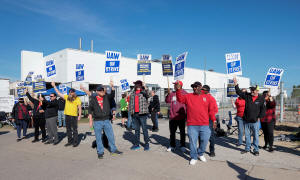UAW strikes at automakers highlight skyrocketing US CEO pay
 Send a link to a friend
Send a link to a friend
 [September 20, 2023] By
Heather Timmons and David Gaffen [September 20, 2023] By
Heather Timmons and David Gaffen
WASHINGTON (Reuters) - When the CEO gets a 40% raise, what do the
workers deserve?
That question is at the heart of the United Auto Workers union's strikes
at assembly plants owned by Ford, General Motors and Chrysler parent
Stellantis.
UAW President Shawn Fain initially asked for a 40% increase in worker's
pay over the next four years - a figure based off an approximately 40%
increase in CEO pay at the companies over the last four years at a time
of stable profits for two of the three automakers.
U.S. auto companies are not alone in handing out massive payouts to
chief executives.
CEO pay and benefits have skyrocketed in recent decades, but worker pay
has not kept pace.
The ratio of CEO pay to the average, non-supervisory production worker
at the biggest U.S. companies has jumped from less than 40 to 1 over the
last four decades to nearly 400 to 1, the Economic Policy Institute
calculated in 2022.

In contrast, some workers for the Big Three automakers who were
protesting on the Ohio to Michigan highway this week said they needed to
work two jobs to survive.
Restructuring the U.S. economy to make things more "fair" for workers
and voters has been a long-stated goal of President Joe Biden's economic
plan. Capitalism is supposed to work "for the good of the American
people," Biden has said, but decades of "trickle down" tax cuts for
companies and the wealthy in the U.S. have undermined the system.
[to top of second column] |

Striking United Auto Workers members picket outside the Stellantis
Jeep plant in Toledo, Ohio, U.S. September 19, 2023. REUTERS/Rebecca
Cook

As the strikes began last week, Biden echoed Fain, saying automakers
should offer more of the share of their profits to workers. But the
White House has little leverage besides the bully pulpit and is
studying how to stave off the economic impact of a long-term walkout
instead.
Attempts to address rising CEO pay in decades past have not had the
intended effect, said Rosanna Landis Weaver, director of wage
justice and CEO pay at As You Sow, a non-profit shareholder advocacy
group.
Salaries were held down, but compensating top executives through the
use of stock options that many considered "free money" increased,
she said.
"Anytime you tried to squeeze pay in one area it popped out in
another - the balloon was never squeezed enough to pop, just enough
for the air to go somewhere else."
(Reporting by Heather Timmons and David Gaffen; Editing by Jamie
Freed)
[© 2023 Thomson Reuters. All rights
reserved.]
This material may not be published,
broadcast, rewritten or redistributed.
Thompson Reuters is solely responsible for this content.
 |